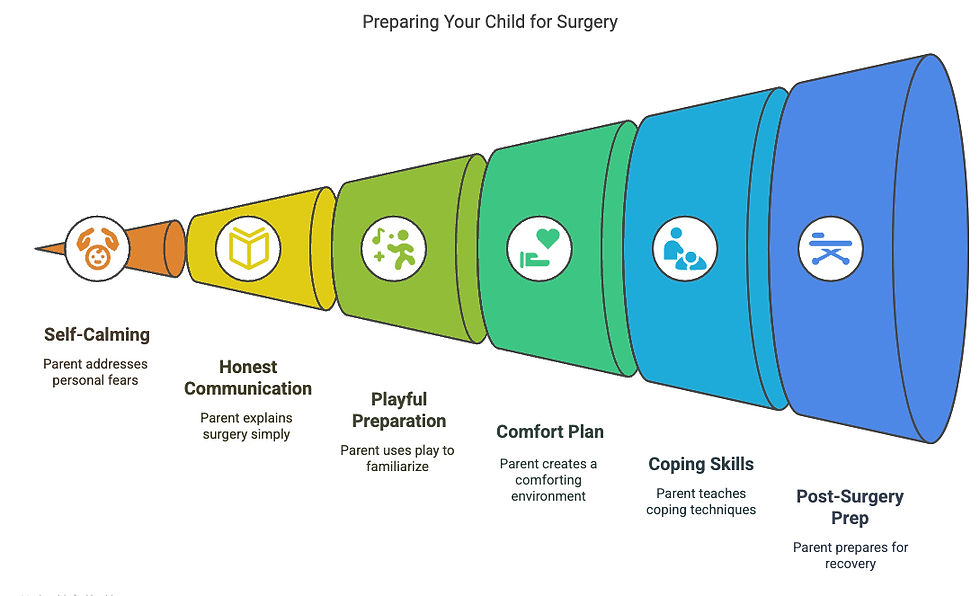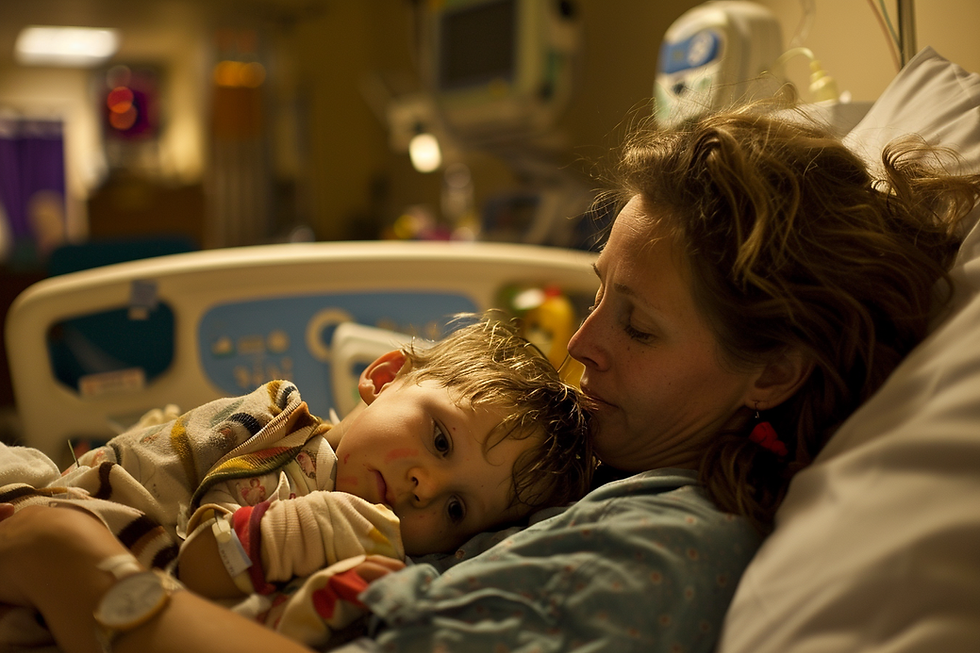Preparing Your Child for Surgery: A Step-by-Step Guide
- Caroline Monteiro
- Jun 5
- 3 min read
Comprehensive preparation strategies to help your child feel ready and confident

You’ve just been told your child needs surgery.
Your heart drops, your brain starts spinning, and you immediately Google things like “how to keep a kid calm during surgery” or “can I swap places with my child in the operating room?”
(You can’t. and no, you're not the only one who thought about it.)
Here’s the good news: kids are resilient, but only when they feel safe, informed, and supported. And that’s where preparation makes all the difference.
Let’s walk through this step-by-step. No medical jargon. No fluff. Just real-world strategies that help you and your child breathe easier.

Step 1: Get Your Own Head Straight First
Before you dive into helping your child, let’s be honest about something:
If you’re freaking out, they will be too.
Children read your body language before they ever hear your words. So take a moment to check in with yourself. Do your research. Ask your questions. Cry in the car if you need to. Then get yourself grounded.
Because calm is contagious.
Step 2: Give Them Just Enough Information
You don’t need to explain anesthesia in detail or recite the surgical steps like a textbook.
But you do need to be honest.
Use simple language. Avoid scary words like “cut” or “put to sleep.” Instead, say things like:
“The doctor is going to help your body feel better. You’ll get medicine that makes you sleep through the whole thing, and we’ll be right there before and after.”
Children process truth better than vague reassurances. What makes things scary isn’t knowing—it’s not knowing.
Step 3: Show, Don’t Just Tell
Words are fine. But you know what really helps?
Play.
Use a stuffed animal or doll to act out what’s going to happen. Let your child be the doctor. Show them a toy mask or pretend to give medicine. This is medical play therapy in action, and it helps reduce fear by building familiarity.
When they’ve played it out, their brain goes, “Oh, I’ve done this before.” That’s powerful.
Step 4: Create a Comfort Plan
Think of it like packing a hospital survival kit—for your child’s emotions.
Their favorite stuffed toy
A cozy blanket from home
Headphones and an audiobook
A simple photo of your family
A “magic spray” (aka water in a travel bottle they mist on themselves for courage)
These small items create a sense of normalcy in an unfamiliar place. They're not silly. They’re anchors.
Step 5: Practice Coping Skills in Advance
Don’t wait until the IV is coming to teach your child how to breathe through it.
Start now.
Try these:
Bubble breathing: Pretend to blow bubbles slowly. Long exhale = calming the nervous system.
Tense and relax: Squeeze fists, then release. Tighten shoulders, then drop. Teaches body awareness and control.
Countdowns: “We’ll count to 10 together while holding your hand.”
Do it often. Make it a game. Make it automatic.
Step 6: Prep for the Post-Surgery Moments Too
Surgery isn’t over when the operation ends. Waking up from anesthesia can be confusing. Your child might cry, feel groggy, or be disoriented.
That’s normal.
Let them know beforehand what might happen after surgery. Say:
“When you wake up, it might feel weird or foggy. But I’ll be there. The nurses will be there. You’ll be safe.”
Familiarity = less fear.
Step 7: Don’t Forget Yourself
Your child needs you to show up as their emotional anchor. That means snacks, water, a charger, and permission to feel all the feelings.
Ask for help. Talk to staff. Rest when you can.
You’re not a robot. You’re a parent doing something incredibly brave—being steady in the storm.
Bonus: Get Our Surgery Prep Toolkit (Free)
We put together a short, sweet guide with everything above (plus printable checklists, play ideas, and a sample script for medical play at home).
Want it? Drop your email below and we’ll send it straight to your inbox.
👇 Help your child feel prepared, calm, and confident:
SEO Keywords: preparing child for surgery, surgery prep for kids, hospital play therapy, medical play, child surgery coping, pediatric surgery tips



Comments